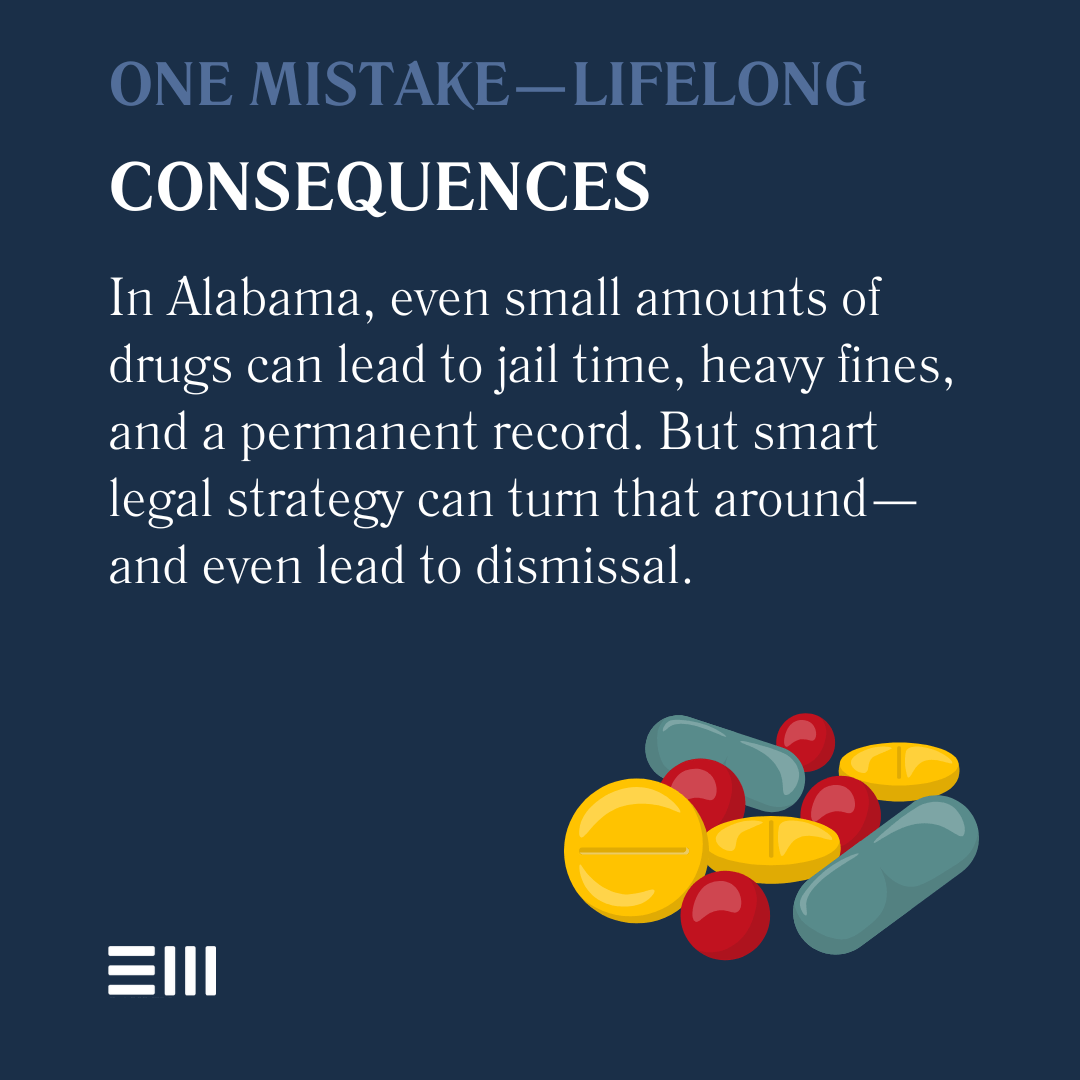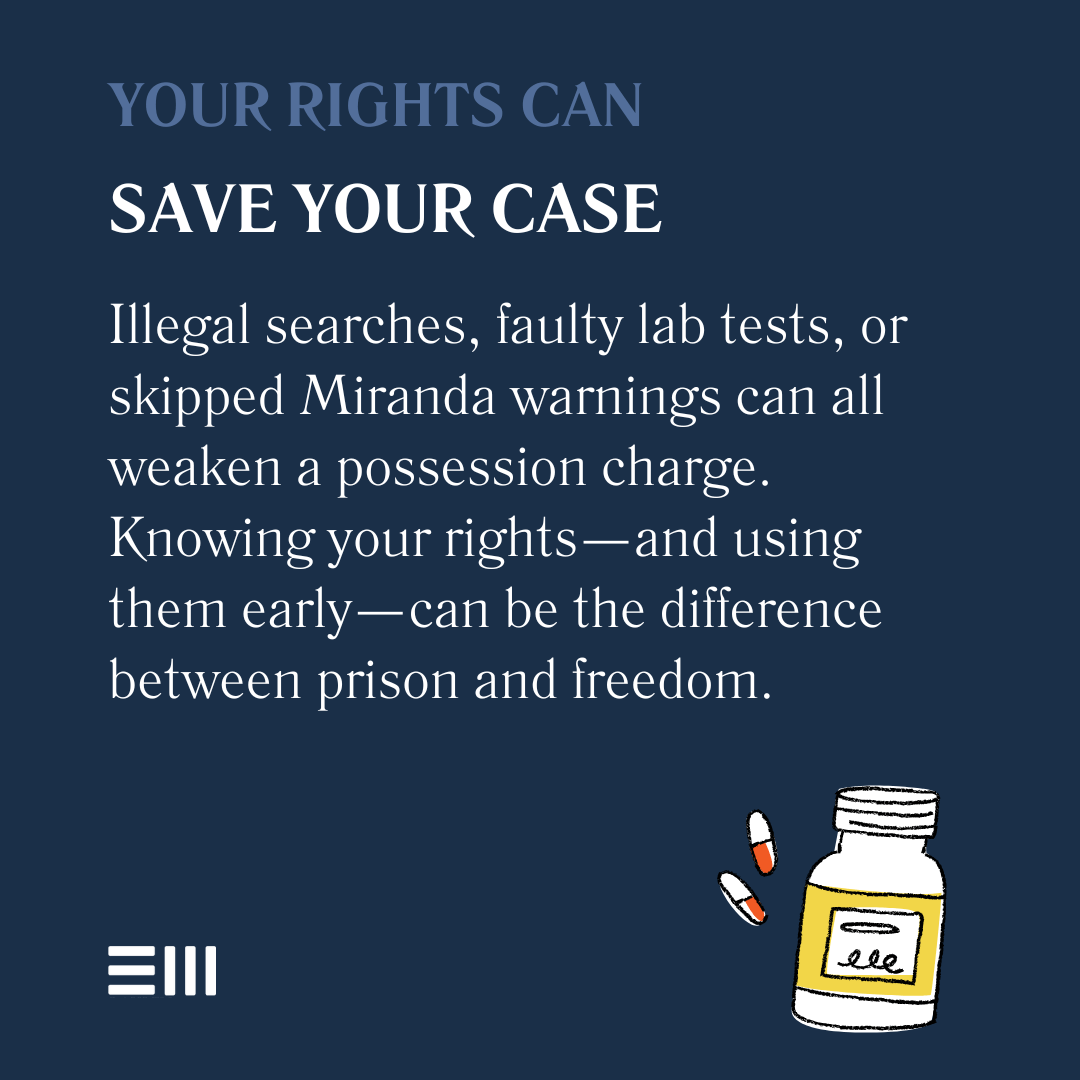Facing a drug possession charge in Alabama can feel like standing at the edge of a cliff—one wrong move and your future could crumble beneath you.
With Alabama enforcing some of the nation's strictest drug laws, a possession conviction can mean years behind bars, thousands in fines, permanent criminal records, and doors of opportunity slamming shut.
Yet many defendants walk away with dismissed charges or significantly reduced penalties when they understand the legal system's nuances and their constitutional rights.
Understanding Alabama Possession Laws and Penalties
Alabama classifies controlled substance possession as either misdemeanor or felony offenses depending on the substance type, amount, and criminal history.
Even small amounts of marijuana can trigger serious consequences, while possession of substances like cocaine, methamphetamine, or prescription drugs without valid prescriptions frequently results in felony charges.
First-time marijuana possession under two ounces typically constitutes a misdemeanor punishable by up to one year in jail and $6,000 in fines.
Possession of other controlled substances or larger quantities often leads to Class C or Class B felony charges carrying prison terms between 1-20 years and substantial financial penalties.
These convictions also trigger collateral consequences, including driver's license suspension, professional license revocation, housing restrictions, educational opportunity loss, and employment barriers that can persist for decades after completing the formal sentence.
Potential Defense Strategies for Possession Charges
The actions you take immediately following a possession arrest significantly impact your case outcomes. Protecting your rights begins the moment of police contact and continues through each stage of the legal process.
When facing possession charges, you should:
- Exercise your right to remain silent beyond providing identification;
- Request an attorney immediately and avoid discussing your case;
- Document all details of the arrest including officer names and badge numbers;
- Avoid discussing your case with cellmates, friends, or family;
- Refrain from posting about your situation on social media;
- Attend all court appointments punctually and dressed professionally;
- Follow all pretrial release conditions meticulously;
- Gather evidence about your whereabouts during the alleged incident;
- Identify possible witnesses who could support your version of events; and
- Preserve communications that might establish alternative explanations.
These early actions create the foundation for successful defense strategies. Remember that statements made to law enforcement without an attorney present often become the most damaging evidence at trial.
Constitutional protections exist specifically to prevent self-incrimination, but their effectiveness depends on defendants actively invoking these rights from the earliest stages of investigation.
Critical Initial Steps After a Possession Arrest
Defeating drug possession charges requires identifying and leveraging weaknesses in the prosecution's case. Experienced defense attorneys examine multiple aspects of your arrest and the evidence against you to develop effective defense strategies.
Common defense approaches include:
- Challenging the legality of the search and seizure that discovered the drugs;
- Questioning the chain of custody and evidence handling procedures;
- Disputing actual or constructive possession of the substances;
- Investigating potential constitutional rights violations during arrest;
- Examining possible entrapment scenarios in undercover operations;
- Exploring whether proper Miranda warnings were issued;
- Identifying police procedural errors or misconduct during investigation; and
- Contesting laboratory testing procedures or results.
The Fourth Amendment's protection against unreasonable searches and seizures offers particularly powerful defense opportunities.
If police conducted searches without proper warrants, probable cause, or consent, evidence obtained may be suppressed through pretrial motions.
Similarly, proving that substances belonged to someone else or that you had no knowledge of their presence can create reasonable doubt that undermines the prosecution's case.
Diversion Programs and Alternative Sentencing Options
Alabama offers several pathways beyond traditional courtroom battles for resolving possession charges, particularly for first-time offenders and those with substances indicating personal use rather than distribution intent.
Potential alternatives to conventional prosecution include:
- Drug court programs combining supervision, treatment, and regular testing;
- Pretrial diversion programs leading to case dismissal upon completion;
- Conditional discharge options for first-time offenders;
- Community service arrangements with deferred prosecution;
- Substance abuse treatment alternatives to incarceration;
- Mental health court programs for dual-diagnosis defendants;
- Veterans treatment court options for eligible service members; and
- Youthful offender status for qualifying younger defendants.
These programs typically require strict compliance with program requirements, regular court appearances, and completion of substance abuse education or treatment.
Successfully completing these alternative pathways often results in charge dismissal, record expungement eligibility, and avoidance of traditional criminal penalties.
However, program violations generally trigger resumption of standard prosecution with potentially enhanced penalties.
Your relationship with your defense attorney substantially influences case outcomes. Effective attorney-client partnerships depend on open communication, thorough preparation, and strategic collaboration throughout the defense process.
When working with your attorney, maximize effectiveness by:
- Providing complete and honest information about your case;
- Sharing all documentation related to your arrest promptly;
- Disclosing prior criminal history even if from other jurisdictions;
- Following legal advice even when it contradicts your instincts;
- Preparing detailed timelines of events surrounding your arrest;
- Maintaining organized records of all court documents and communications;
- Responding promptly to attorney requests for information;
- Asking clarifying questions when legal strategies seem unclear;
- Participating actively in defense strategy development; and
- Reporting any new police contacts or witness communications immediately.
Your attorney's ability to construct effective defenses depends largely on having comprehensive information about your situation.
Attorney-client privilege ensures confidentiality, making complete disclosure essential for identifying the most promising defense approaches.
Remember that surprises at trial typically benefit prosecutors rather than defendants, making transparency with your legal team crucial for case success.
Frequently Asked Questions About Beating Possession Charges in Alabama
Alabama defendants facing drug possession charges often share common questions about navigating the legal system effectively.
These answers address the most common concerns about fighting possession charges in Alabama courts.
What if the Drugs Didn't Belong to Me?
Prosecutors must prove you knowingly possessed the controlled substance—either through actual physical possession or constructive possession by having control over the area where drugs were found. If the drugs belonged to someone else and you had no knowledge of their presence, this creates a viable defense.
Your attorney may challenge ownership through witness testimony, fingerprint evidence, or establishing that others had equal access to the location where substances were discovered.
Can I Beat a Possession Charge if Officers Didn't Read My Rights?
Miranda warnings are required only when you're both in custody and being interrogated. If police questioned you while in custody without reading your rights, statements you made may be suppressed.
However, this doesn't automatically dismiss the entire case if other evidence exists. The drugs themselves and observations by officers often remain admissible regardless of Miranda violations, making this a complex defense requiring professional legal analysis.
How Do I Know if the Search That Found Drugs Was Illegal?
Searches require either a valid warrant, a legitimate exception to warrant requirements, or proper consent. Warrantless searches may be illegal if conducted without probable cause, during improper traffic stops, beyond the scope of consent given, or as fishing expeditions without reasonable suspicion.
Your attorney will examine police reports, witness statements, and officer testimony to identify potential Fourth Amendment violations that could support suppression motions.
Take Control of Your Defense Today
A possession charge doesn't have to derail your entire future. With knowledgeable legal guidance, many defendants successfully challenge these cases through procedural defenses, constitutional protections, and alternative resolution pathways.
Our experienced criminal defense attorneys understand Alabama's complex drug laws and how to identify weaknesses in prosecution cases. We've helped hundreds of clients avoid the devastating consequences of drug convictions through aggressive motion practice, skilled negotiation, and strategic case development.
Contact Baxley Maniscalco today for a confidential consultation about your possession case. Our team will evaluate your legal options, explain potential defenses, and develop a customized strategy to protect your rights and future opportunities.


